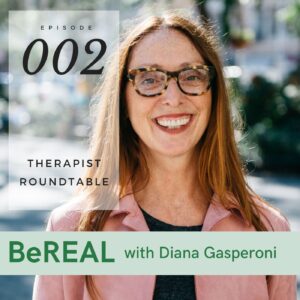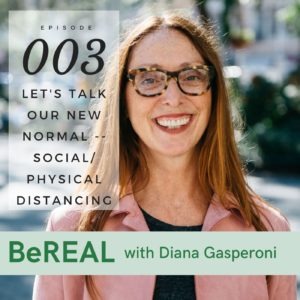Podcast: Play in new window | Download (Duration: 54:17 — 29.4MB) | Embed
Subscribe: Google Podcasts | RSS
I’m Diana Gasperoni, and I’m the host of BeREAL. I’m super excited for our second episode today. Today I have the BeREAL team in the house, which is super exciting. I have Ednesha Saulsbury. She’s a psychotherapist. She works with us at Be Well Psychotherapy. She also has a program that she’s going to talk about… which supports black women.
Then we have Divya Robbin, who is soon to be on the clinical side at Be Well, but does all the support for me, personally. She does tech support, admin support and she is in charge of all the social media. She is getting ready to sit on the clinical side. Today we’re going to talk about what psychotherapy is. Ladies, I’m going to ask you both. We’ll have Ednesha start first. Why does talking help? What is psychotherapy? What is it?
Ednesha says, “I think it’s interesting because when I think about psychotherapy, it’s all about awareness. It’s a place to talk through or work through not just problems (which I also think is a misconception), but all questions you have about your thinking habits, your feelings, understanding others, and how other people experience you or you experience them. One big thing is, I definitely feel that it’s a place to build compassion for yourself as well as others, but more importantly for yourself. I think we can be harder on ourselves than anyone else can be on us. Sometimes it’s just about having that time and that space to explore being empathetic, being compassionate, being accepting of ourselves. When I view psychotherapy, that’s how I view it. Building awareness.”
Divya says, “For me, psychotherapy is such a wonderful place for people to take a step back. We live, so often, on autopilot. We’re moving, thinking and feeling in ways that we’re not really acknowledging. Psychotherapy is a great place to sit and acknowledge our experiences, acknowledge our thoughts that are day-to-day, look back at our relationships to bring awareness to that. When we’re on the go so much, we don’t have a lot of awareness. Psychotherapy is a great place to do that. While we’re doing that, we can improve our relationships, improve our thoughts, and start to form more positive coping strategies. That is a wonderful way just to give yourself the ability to do that. That’s what to me psychotherapy is.”
Diana says, “So we get to sit back and look at who we are in the world. I’m my own biggest critic. What is about talking that’s important?”
Ednesha says, “For some of us, talking is foreign. Maybe it wasn’t engaging. People didn’t talk about themselves…” It’s important to get those ideas out, and also have someone who will listen.”
Divya says, “It’s important to have that space.” Instead of holding that within ourselves, causing anxious thoughts, it’s important to have an outlet… She says that there’s not enough education. You should feel open to talk, with those thoughts and feelings being accepted.
It’s like ping-pong, throwing the ball against the wall and see what bounces back. Ednesha says that it’s a way to gain understanding.
It’s like a petri-dish, an experiment. You get to try different things to see what works in the real world.
Communicating can be harder when technology comes into the room. We communicate differently, particularly the younger generation. Divya talks about how she helps students develop skills in their own relationships and put them into practice.
Diana talks about how people go to therapy for a number of reasons. Then, when they get there, they don’t want to talk.
Ednesha talks about how we’re conditioned to talk about relationships and communication.
Divya says that there’s a feeling of guilt. There may be cultural barriers as part of the transition. It may feel uncomfortable, but they can build an alliance. It’s a no-judge zone. It’s about being accepting, to just listen.
Diana asks how you bring about a shift in language from selfish to self-care.
Ednesha talks about how self-care impacts every part of your life: in your lives, in your relationships, at work. It will be better in the long run. Most of the time the discussions are around communication.
Diana talks about how they explain what they do, as therapists.
Divya focuses on what the goal of the session is.
The goal is to treat the whole person, everything that is going on at that moment. Diana likes a long-term relationship in treatment. It’s about working together to rebuild, heal, etc.
How do you find the therapist who is right for you?
Ednesha says it’s important to see what it feels like to be in the room with the therapist. Talk to the therapist. Is it comfortable? She wants to understand what’s going on in the person’s life, what went on in their childhood, etc.
Divya says that it’s ok to shop around. You won’t connect with everyone that you meet.
Diana recommends that you see the therapist more than once. Try 3 sessions. She sees it as almost like dating.
Ednesha says it’s hard to determine if you’re seen and heard and validated in just one session. Those are things you may not experience with other relationships. It can be hard to judge from one session. There are expectations.
It doesn’t have to be forever, but it is a lifelong process for some people. Ednesha says that it’s a choice. People go in and out of therapy. She says it’s a place she feels seen, heard, and understood. She’s a “lifer.”
You may come to therapy because of a crisis. For some, it’s for self-exploration. Divya says it comes down to what the individual is trying to get out of therapy.
There’s the opportunity of a check-in, where you are comfortable enough to have a continued relationship, depending on the therapist. It’s hard to process endings. Talk about what’s scary, but also to normalize the process.
How do you put a value on your metal health? Diana says that they will be talking about that more in the future.
You’ll also want to listen in to find out more about their 90’s jams…
And what would their billboards say?
Join the BeReal Facebook group to offer input on the BeReal closing tagline.
facebook: https://www.facebook.com/Be.WELL.Psychotherapy/
instagram: https://www.instagram.com/bewell.psychotherapy/



